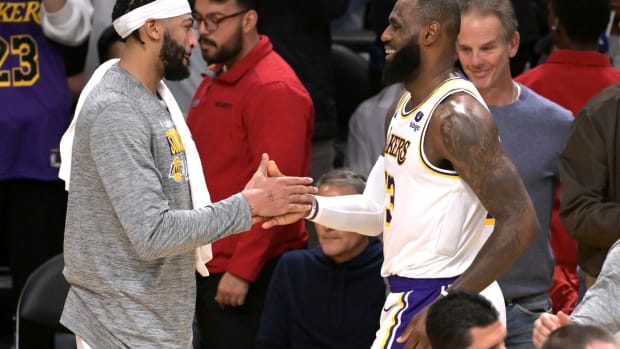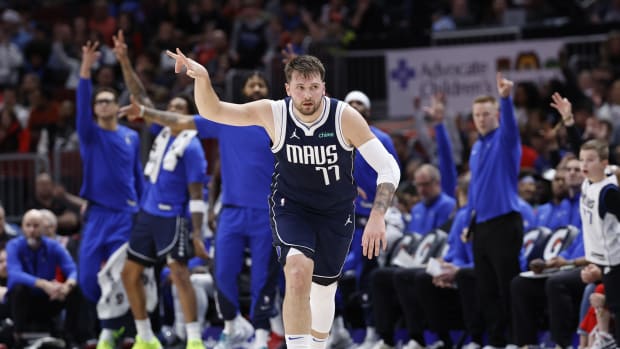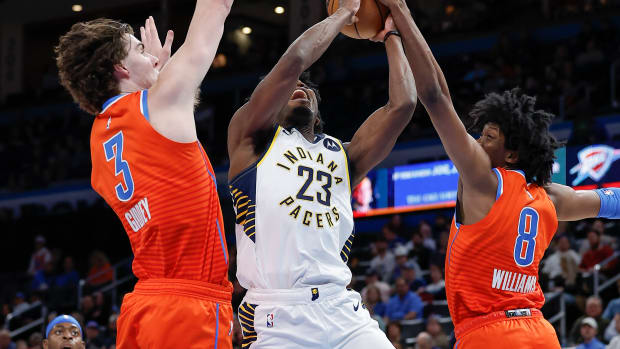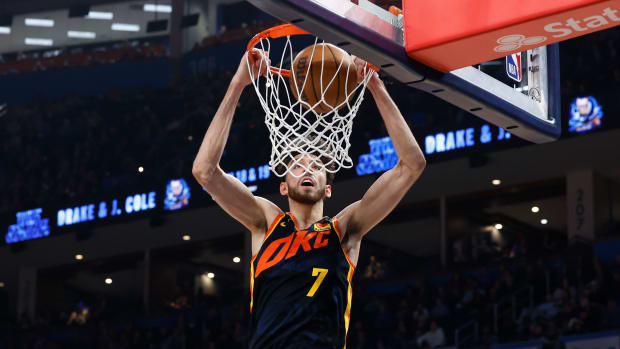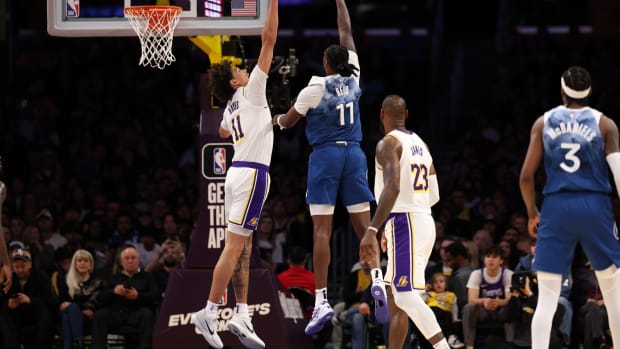Kemba Walker Isn't Kyrie Irving, and Maybe That's a Good Thing for the Celtics
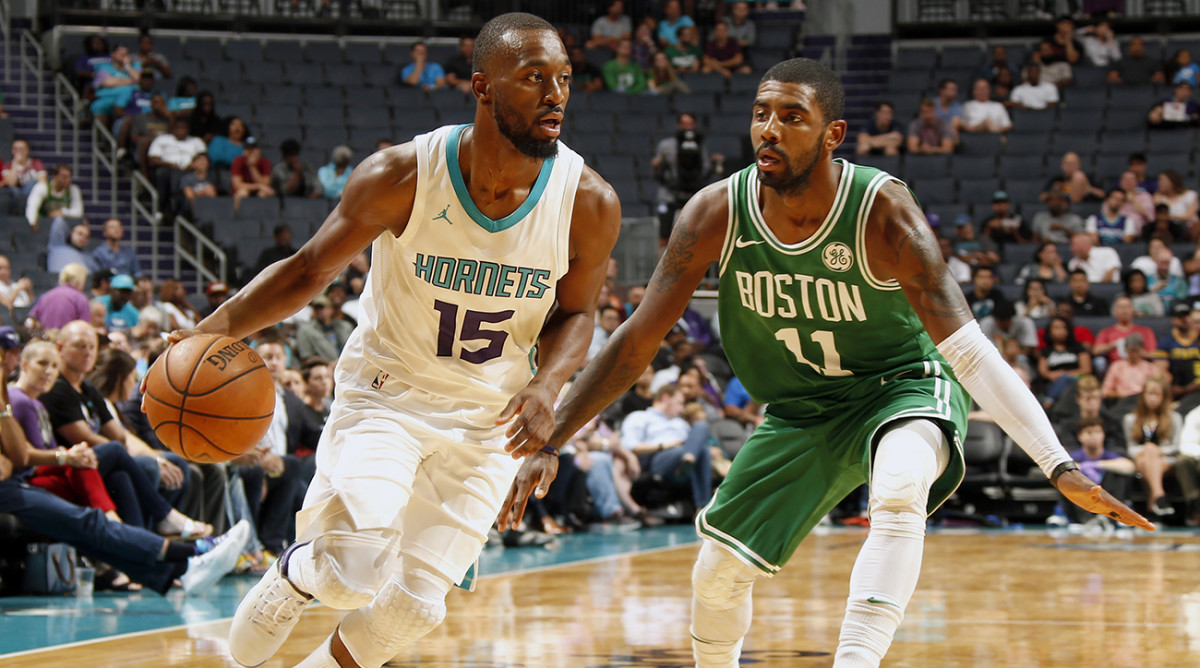
Signing Kemba Walker was never the Celtics’ plan. Kyrie Irving was supposed to stay in Boston for the foreseeable future, as he said he would; Anthony Davis might follow, setting up the franchise for a decade; Al Horford was expected back, Gordon Hayward would return closer to form, Jayson Tatum and Jaylen Brown would continue apace, and the Celtics would have claim to the Eastern Conference. The only reason Walker is involved is because the fabric of those intentions came undone.
Irving is gone. Davis is a Laker. Horford, having declined his option for next season, appears set on signing elsewhere. So much had to go wrong in the past year to bring Walker and the Celtics together. Once it did, it’s easy to understand what they saw in one another. Even without Irving and Horford, Boston offers Walker a better supporting cast than any he enjoyed in Charlotte. The appeal for the Celtics comes not only from the fact that Walker is an excellent basketball player—well worthy of his All-NBA selection last season—but excellent in ways they understand. Walker is the closest basketball analogue to Irving.
Almost all of the reasons that Irving made basketball sense for the Celtics apply just the same for Walker. The mechanics are different without Horford involved (assuming that Boston doesn’t pull together an improbable sequence of moves to clear enough cap space to re-sign him), but the general principles remain unchanged. Move a scoring guard around the floor, weaponize him in balance off the catch and off the dribble, and keep the defense guessing as to where a possession might go next. It worked for Isaiah Thomas, it worked for Irving, and it will work for Walker. One of the best qualities of a Brad Stevens offense is the way it springs a guard loose without dedicating an entire system to the effort. Unlocking a scorer like Walker is part of the machinery rather than an end product in itself.
That has to come as a relief to Walker, who has been featured enough. For five straight years, Walker led the Hornets in scoring. During that time, his most productive teammates have been Nicolas Batum, Al Jefferson, Mo Williams, and a Dwight Howard in steep decline. Charlotte qualified for the playoffs just once in those five years. Had Walker re-signed, he would have committed the remainder of his prime to a franchise without proof of concept and without the means to significantly improve. Joining Boston is a play for upward mobility. It gets Walker back to the postseason, aligned with the kinds of players who can actually make his job easier. By next season, Tatum could already be the best player that Walker has ever worked with. (Hayward could also fit that criterion, if he were back to his pre-injury self.)
Walker has been the odd shooter who actually makes a higher percentage of his threes when pulling up than when spotting up. Is that an honest expression of his playing style or an indictment of his roster’s substance? We’ll soon find out. For a possession to come back to Walker in Charlotte often meant that it went nowhere. In Boston, that’s just a matter of course. Having teammates capable of sharing in the creative destiny of an offense changes everything. It means that Walker, already reasonably efficient, will have to force less. It means that a guard who ran pick-and-roll after pick-and-roll last season while finishing third league-wide in total minutes played will be better able to pace himself. Walker will soon enjoy the freedom of being able to play basketball without the sole responsibility of being an offense unto himself.
Consider that Walker was already a more efficient scorer in the pick-and-roll than Irving was last season, per Synergy Sports, while running literally double the number of pick-and-rolls and without the benefit of Boston’s screening and spacing. Plug him into the same systems and they should work to similar effect. The reason things never clicked for Boston last season wasn’t because the players didn’t fit or because the offense didn’t make sense. The Celtics snapped under the strain of their own competing motivations. Irving’s tact in the locker room only exacerbated the problem. For Walker to replicate so much of his skill set without the same interpersonal baggage is a change of real consequence.
Basketball is personal. The members of a team don’t have to be groomsmen in each other’s weddings or pick each other up from the airport, but they need to be aligned enough to focus on operational nuance. What makes Walker a nice fit for the Celtics, after the year they’ve had, is that you don’t have to second-guess in intent. Walker worked his ass off for years, without complaint, as his franchise flailed around him. He was resolute when the Hornets gave him no reason to be. There are basketball things that Irving does better than Walker. Even other star guards can’t create in quite the same way, given the unique avenues afforded by Irving’s handle and finishing ability. What gives Walker a chance to be an even better fit for Boston is the way his contributions are realized. Get close enough in the skills that matter most, empower teammates in ways Kyrie never did, and Walker could help fulfill some of the promise the Celtics thought they had.
There’s work still to be done. Even if Walker is a clean substitute for Irving, that doesn’t address what the Celtics would lose in Horford. Practically speaking, this could be a kind of reimagining: one that demands more of Tatum, Brown, and Marcus Smart, with Walker as a sort of conceptual bridge from one stage to the next. The prospect of paying Kemba max money over the final two years of his contract is somewhat concerning, if only because players his size tend to age out of stardom quickly. Walker is 29 years old. Only a handful of guards his size have ever been 20-point scorers past age 30, and only three—Allen Iverson, Lou Williams, and Mike Conley—have done so since the 1970s.
Walker might not be the same player two years from now. Boston is banking on the idea that Tatum and Brown won’t be either. Fit is always fluid. What works today can always change. What makes sense in the moment can always turn once a group of people live and work to see it achieved. Irving stands as proof. There is so much in common between Kemba and Kyrie as players, save for one important distinction: only one of the two is the kind of person a team should feel comfortable investing in with a four-year max contract. The other just left the building.































